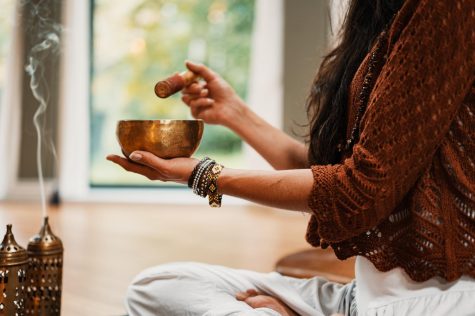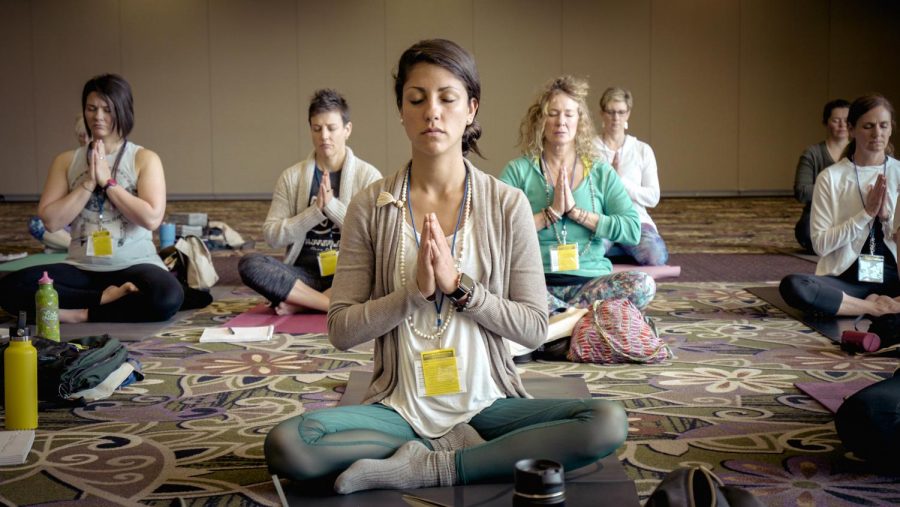The Art of Meditation
February 17, 2021
With these unprecedented times, the art of meditation can be beneficial. Many people suffer from negative feelings that keep them from sleeping, focusing, completing tasks, or even feeling good about themselves. Meditation lowers these stress levels, helps people connect with their emotions, improves focus, and promotes positivity. Meditation isn’t just something monks do, it is a practice that everyone can incorporate into their life and is so much more than paying attention to breathing, even though that is the basis of the practice. Since the beginning of this pandemic, 50% of teens have reported struggling with anxiety, 43% reported having feelings of depression, and overall 45% reported more stress. Students can benefit from this practice because the demands of school during a pandemic and sitting in front of a computer all day is extremely taxiing on the mental health of many people. Practicing meditation for just five mins can provide some sense of calm and help “reset” the mind to be able to focus and get things done.
 Meditation may seem like some large commitment that requires lots of concentration and sound-of-mind but, simply put “Meditation is setting time aside to focus on your mind” says Ms. Collins, an English teacher at WHS who has received many certifications and training in Positive Psychology, yoga, and meditation. Beyond the idea that meditation is taking time to oneself, it can provide a capacity within the user such as clarity about how life is unfolding and even peace. A common thing people may assume is that one uses meditation when they feel stressed or overwhelmed but, this isn’t necessarily the case. Ms. Collins states that “You don’t ‘use’ meditation, really. Meditation uses you! It’s a way of clearing out the trash.” Meditation is something that can help cleanse your mind of intrusive thoughts and feelings and pave the way for clarity and peace of mind.
Meditation may seem like some large commitment that requires lots of concentration and sound-of-mind but, simply put “Meditation is setting time aside to focus on your mind” says Ms. Collins, an English teacher at WHS who has received many certifications and training in Positive Psychology, yoga, and meditation. Beyond the idea that meditation is taking time to oneself, it can provide a capacity within the user such as clarity about how life is unfolding and even peace. A common thing people may assume is that one uses meditation when they feel stressed or overwhelmed but, this isn’t necessarily the case. Ms. Collins states that “You don’t ‘use’ meditation, really. Meditation uses you! It’s a way of clearing out the trash.” Meditation is something that can help cleanse your mind of intrusive thoughts and feelings and pave the way for clarity and peace of mind.
Meditation can be done whenever the practitioner deems it necessary. It can be done in any and all circumstances especially once one knows the basics. Meditation can be done any time somebody wants to experience more joy and less strain within their life. When the basics of meditation are being learned, it is easiest to use the tool properly when in a quiet and comfortable environment. Once there is more knowledge about meditation a person could virtually utilize it anywhere. If one wants to utilize meditation more in their life they should simply try it. Ms. Collins’ recommendation is to “Get an app if you think you need one. But just sitting quiet for one minute with your eyes closed – even that effort, done consistently over time, will yield positive results.” The app Calm is the number one app for sleep, meditation, and relaxation which takes a monthly subscription of $14.99 or a yearly subscription of $69.99. Another app that requires subscription is Headspace: Meditation & Sleep with a monthly subscription of $12.99 or a payment of $69.99 for the year that offers guided meditations and sleep stories. Lastly, Insight Timer – Meditation App has free meditation that can help with sleep, stress, and anxiety. If meditation is something a person wants to try, they should stop thinking of it as something that already takes being connected to your mind because it is about gaining that connection.
Many may think that positivity and meditation have to go hand-in-hand or meditation will be unsuccessful, but Ms. Collins explains how that is not the case. positivity is not being happy all the time and never feeling sadness or anger. Ms. Collins says, “Meditation is not about covering up our feelings and putting a smiley face on them. It’s much more about learning to feel ALL our feelings, and learning to not be afraid of them.” In addition, the sooner we learn to feel all our feelings and to not fear them, the sooner they pass. Ms. Collins states, “Basically, we DO meditate because we believe it will bring us to greater states of emotional joy, but really, there’s no ‘goal’ in meditation. You don’t meditate to get somewhere. You meditate to learn how to be okay where you are.”
Meditation is much more than being positive, it is about learning how to feel without fear and welcoming clarity and peace in along with it. In the end, we are so much more than our feelings. If a person is finding themselves with overwhelming feelings of uncertainty, stress, anxiety, and a jumbled mind they should incorporate meditation into their daily routine and go into the practice with an open mind.







